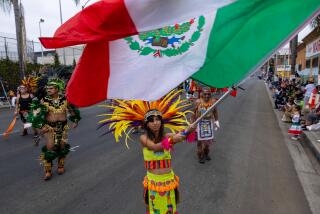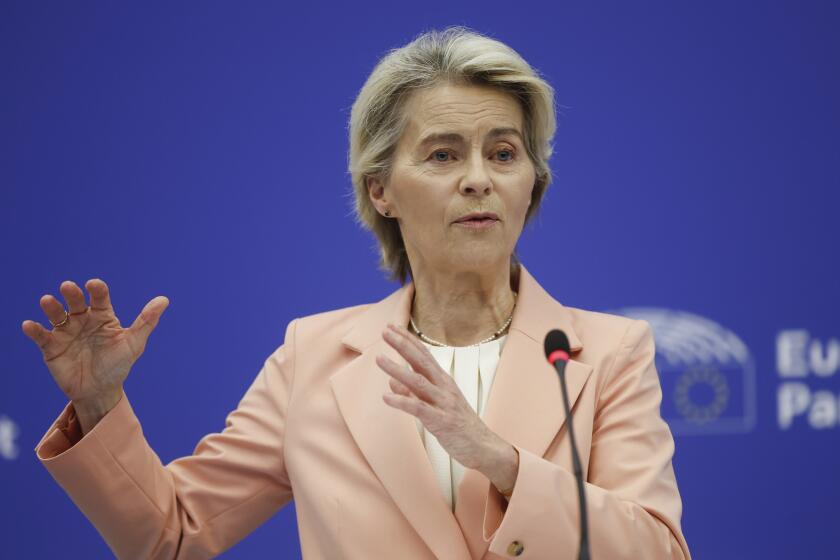S. Africa to Free Black Leader Mandela Today : Apartheid: Activist has been in prison for 27 years. De Klerk’s action is the latest step to lure black anti-apartheid leaders to the negotiating table.
President Frederik W. de Klerk announced Saturday that 71-year-old Nelson R. Mandela, who personifies nearly a century of black struggle to end white minority rule, will walk free today after more than 27 years in prison, putting South Africa on a dramatic new course toward ending one of the bloodiest racial conflicts in history.
“This will bring us to the end of a long chapter,” De Klerk told a news conference. “There can no longer be any doubt about the government’s sincerity in seeking to create a just dispensation based on negotiations.”
The president’s surprise announcement followed a meeting Friday night with Mandela, in which De Klerk said he was convinced that the man jailed for plotting to overthrow the government is “committed to a peaceful solution.”
Mandela, convicted in 1964 of sabotage for launching the African National Congress’ armed guerrilla war against Pretoria, is one of the world’s most celebrated prisoners. His incarceration has been the main impediment to negotiations with the 27 million blacks in South Africa, and his release is the latest in a succession of steps De Klerk has taken to remove restrictions to black political activity and lure black leaders to the table.
De Klerk said that Mandela will be freed at 3 p.m. (5 a.m. PST) today from the Victor Verster prison farm near Paarl. Anti-apartheid leaders said that he will address a rally this evening in Cape Town before returning to his home in Soweto, a township of 2.5 million outside Johannesburg that he last saw in 1962.
The government also released the first photograph of Mandela in 27 years. It showed a smiling, trim Mandela, dressed in a gray suit, standing beside De Klerk in the presidential offices in Cape Town.
Thousands of blacks took to the streets of Soweto and other townships Saturday night as news of the impending release spread, and joyous throngs celebrated Mandela’s return with dancing, singing and blaring car horns. Some held aloft Sunday morning newspaper posters that read, simply: “He’s Free!”
Archbishop Desmond M. Tutu, upon hearing the news, got out of his car in Soweto and leaped into the air, shouting “Hooray!”
“F. W. (de Klerk), you have done well,” Tutu said. “Today is not a day to be churlish. It is a time to say, ‘Yeah!’ It is a time to celebrate.
“Nelson is going to be the focus of all our aspirations,” added Tutu, the black clergyman who won the 1984 Nobel Peace Prize for his anti-apartheid work. “He will unite us.”
The announcement drew swift, unreserved praise from government supporters as well as critics around the world. President Bush called it a “significant step” on the road to an end of apartheid. British Prime Minister Margaret Thatcher congratulated De Klerk for his “wise decision.”
The previously banned ANC, which was legalized by De Klerk last week, welcomed the news at its exile headquarters in Lusaka, Zambia.
“It’s a great victory for our people,” said James Stuart, a member of the ANC’s executive committee. “I can hardly believe it.”
“This is a moment we’ve waited nearly 28 years for,” said Popo Molefe, general secretary of the United Democratic Front, a 2-million-member anti-apartheid coalition. “His release is the result of the struggle of our people.”
De Klerk’s decision went most of the way toward meeting preconditions for negotiations set down by the ANC and other anti-apartheid groups. The president said that he and Mandela discussed the two major remaining conditions--the release of all political prisoners and the lifting of a 3 1/2-year-old state of emergency.
De Klerk said he would lift the state of emergency if there was no upsurge of violence after Mandela’s release. He also told Mandela that the matter of activists on trial and serving time for politically motivated violent crimes “should be dealt with in negotiations,” but he offered to enter “exploratory discussions” on the issue in the meantime.
“The eyes of the world are presently focused on all South Africans,” De Klerk told a news conference attended by some of the more than 2,000 journalists that the government has allowed into the country in recent weeks. “All of us now have an opportunity and the responsibility to prove that we are capable of a peaceful process in creating a new South Africa.”
Freeing Mandela was a calculated risk by the government. The swift decision, and the sweeping measures that De Klerk announced last week, caught the ANC and other leading anti-apartheid groups temporarily off balance.
But the government will now come under increasing pressure from blacks, through rallies and marches, to move quickly to remove the remaining legal pillars of apartheid, the system that segregates residential areas, schools and hospitals and inhibits black ownership of land.
In recent days, police have forcibly broken up several peaceful anti-apartheid demonstrations, and Mandela has said that, once free, he will refuse to obey any apartheid laws.
But Mandela will be faced with the task of healing deep divisions in black politics, including differences within his own ANC over whether to negotiate with the government now or continue the armed struggle. He also will be called on to help end fighting in Natal province, where three years of internecine clashes between supporters of the ANC and the moderate Inkatha movement have resulted in more than 1,500 deaths.
Mangosuthu Gatsha Buthelezi, leader of South Africa’s 2 million Zulu people, said the conflict between his Inkatha movement and Mandela’s more radical ANC “must be now set aside so that we put the good of the state before the good of political parties.”
“I am overjoyed that the man Mandela, the husband and the father and the friend, is now free,” said Buthelezi, the chief minister of a self-governing homeland created by the South African government. “Nothing will ever take away South Africa’s shame for keeping this man in jail for over 25 years.”
Buthelezi split with the ANC 30 years ago over the armed struggle, but he has exchanged letters with Mandela in prison and refused to negotiate with the government until the ANC leader was free.
The lone criticism of De Klerk’s decision came from right-wing whites. The Conservative Party, which won 31% of the vote in last September’s elections, said the release of a “dangerous criminal” like Mandela is evidence that the government plans to hand over power to the black majority.
“Mr. Mandela has won a knockout,” said Conservative spokesman Koos van der Merwe. “Mr. de Klerk has capitulated completely.”
And, as De Klerk spoke, right-wing extremists from the Afrikaner Resistance Movement, known by its Afrikaans initials, AWB, marched in the capital of Pretoria and chanted: “Hang Mandela!” Police said that AWB supporters scuffled with several bystanders and that two people were injured.
De Klerk stunned South Africans on Feb. 2 by lifting the 30-year ban on the ANC, the Pan-Africanist Congress, the South African Communist Party, and 60 other anti-apartheid groups. He also lifted restrictions on hundreds of government opponents, removed several state-of-emergency regulations and declared a moratorium on hangings until Parliament can consider legislation giving judges more latitude to spare defendants.
The president has said that he wants to create a climate for negotiations for power sharing between blacks and whites. Black leaders are seeking majority rule for the country, in which blacks outnumber whites 5-to-1, while De Klerk envisions a constitution that will prevent domination of the white minority by the black majority.
“The government is committed to bringing about, through negotiation, a new constitution which is fair and just for all the people of South Africa,” De Klerk said Saturday. “I hope that now that this chapter has ended, the world and more especially the people of South Africa will grasp the opportunity and play whatever supportive role can be played toward a peaceful conclusion.”
De Klerk said that his actions were not specifically designed to end economic sanctions against his country.
“We are not working against checklists,” he said. “We are doing what we believe is in the best interests of South Africa.”
In recent days, the government has expressed fears about threats to Mandela from right- and left-wing extremists. While De Klerk said that his officials are discussing security matters with Mandela’s colleagues, he added: “When he is released, he becomes a free man. He doesn’t owe it to me to inform me about his program.”
De Klerk said that Mandela’s release will be unconditional. Six years ago, Mandela had spurned offers from De Klerk’s predecessor, Pieter W. Botha, to renounce violence in exchange for freedom. Asked if Mandela had repudiated violence, De Klerk said Saturday that the black leader would have to speak for himself.
The government hopes that Mandela will become a facilitator for talks by persuading the ANC to publicly move away from its guerrilla war and accept the government as participant in the negotiations. For months, key government figures have been talking with Mandela in the three-bedroom prison home he occupies, and De Klerk has met the prisoner twice since December.
De Klerk said that Friday night’s talks between the two men “took place in a good spirit.”
“He is a friendly man. I like to think I am also a friendly man,” De Klerk said with a smile. “He’s an elderly man, he’s a dignified man, he’s an interesting man.” De Klerk declined, however, to comment on Mandela’s reaction to the news that he would be freed.
The Rev. Jesse Jackson, on a 12-day visit to South Africa, called De Klerk’s actions courageous, but he said that the United States and other countries must maintain pressure on the government until apartheid is abolished.
“He is out of jail, but not free,” Jackson said. “Not free to move to the neighborhood of his choice, not free to send his grandchildren to the school of his choice, not free to vote, not free to run for office in his own country.”
Related STORIES: A11-A14
More to Read
Sign up for Essential California
The most important California stories and recommendations in your inbox every morning.
You may occasionally receive promotional content from the Los Angeles Times.











